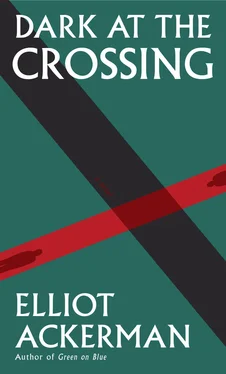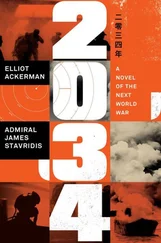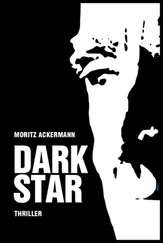Amir turned from his reflection to look at his wife. He seemed moved that she’d cook for him. “You wouldn’t mind fixing me a plate, would you?”
“There’s none left,” she said. Her eyes fell on Haris as she spoke to her husband: “You’ve slept too long.”
Their cab pulled around the curved driveway of Delvet Hospital. Daphne took a fold of lira from her coat pocket. Holding it low, between her knees, she counted out the fare. Haris thanked her as she passed the bills to the driver, mentioning how he would pay her back. She said nothing.
Beyond the entrance’s sliding glass door, a receptionist sat bunkered behind a tall desk. She wore a clean white hijab and typed at a computer. She glanced up as Daphne passed. The two greeted each other, speaking for a bit in Turkish. As they did, Haris considered the hospital. The buffed linoleum corridors gleamed beneath fluorescent bulbs. Doctors ducked in and out of private patient rooms. Nurses wheeled carts filled with medications down the ward, or they picked up trays of discarded food from the morning’s breakfast.
Daphne and the receptionist finished whatever matter they’d been discussing. The receptionist skimmed her eyes over Haris. Before she could say anything, Daphne added some last point in Turkish. The woman laughed, waving them past as she went back to work.
Haris and Daphne continued down the corridor. “What was that about?”
“She wanted to know who you were.”
Haris cocked his head.
“I told her not to worry, you weren’t another Amir.”
“She knows Amir?” he asked.
“Let’s just say since we’ve been here, Amir has gotten to know lots of the nurses. That’s why she laughed.”
The two stood in front of an elevator bank. Daphne pushed the down button.
“It’s a nice hospital,” said Haris.
Daphne gazed along the pristine corridor. “I suppose this part is.” She pushed the button again. “They treat Syrians in the basement. The receptionist asked me to help with a man there. It’s time for him to leave.”
They stepped inside the elevator. Just before they reached the basement, a sweet, stale smell like a mix of tainted water and spoiled food, all blanketed by a sharp chemical antiseptic, pricked Haris’s nostrils. The doors opened, and a dank heat enveloped them. Within moments sweat beaded along the arch of Haris’s back, beneath his sweater.
Along the basement corridor, parallel to the fluorescent bulbs overhead, heating pipes ran, dripping condensation. No one had buffed the floors and, at the places where the pipes dripped, concentric circles of brown water damage cratered the linoleum tiles. A few private rooms dotted the corridor, but there weren’t enough of them. Cots spilled into the hall, each partitioned by little more than a rod and curtain, or nothing at all. Food trays littered the way, but unlike upstairs, not a morsel was left on them. Even if patients weren’t well enough to eat, their families hoarded the remnants of their meals. Most of the families, as Haris had learned the night before, slept in Antep City Park.
Haris followed Daphne to a door halfway down the hall. She stopped before entering and turned toward him. “I’m going to need your help in here.”
“Of course,” said Haris.
“This patient’s brother, a man named Jalindar, brought him from Azaz,” said Daphne. “He’s been comatose for nearly a month. Yesterday the hospital told Jalindar they could no longer treat his brother. But Jalindar won’t leave. He’s in there with his nephew, the patient’s son.”
“What do you need me to do?”
“Play with the boy while I talk with Jalindar,” she said.
Haris shrugged. The task seemed easy enough.
“The boy is complicated,” said Daphne.
“Complicated?”
“Jalindar and his brother are twins,” Daphne continued. “Jalindar had spent a few years working in Kilis away from the family. After his brother was hurt, when Jalindar crossed the border into Azaz to get him, the boy thought his father had recovered. Before that, the boy had only seen his uncle once or twice. Jalindar hasn’t explained things yet.”
“That doesn’t seem right,” said Haris.
“You think it’s better to explain all of this to a little boy?”
Haris didn’t have an answer. “What’s the boy’s name?”
“Daoud.”
Daphne opened the door. Haris followed her inside. Tucked into the corner, a quarter-size window circulated cool, fresh air. A rectangle of light fell from the window, landing in a band along the single bed, which filled most of the room. The bandaged carapace spread across the sheets was barely recognizable as a man. A leg and arm were missing. The face covering left only a wandering eye and half-gaping mouth exposed. The IV stands hung around the bed, keeping the man alive through some hydraulic mystery. The only movement Haris saw was the clear liquid which passed through these tubes. A gust of wind slipped in through the window. The man’s free eye blinked wildly for a moment, twitching at the breeze. Then the air stilled and the man’s vacant look returned.
On a wooden footstool next to the bed sat Jalindar, his wiry torso hunched forward, his elbows balanced on his knees, clutching a newspaper. He’d been reading aloud to his brother, but choked his words off as soon as Haris and Daphne entered.
“A friend of mine’s joining us,” said Daphne. “I hope you don’t mind.”
Jalindar shook his head, standing from his footstool and tucking his newspaper beneath his arm. He offered his seat to Daphne, and his hand to Haris, who shook it. She waved his offer away and sat on the floor with her back to the wall. An awkward silence hung in the room. Haris at first assumed that Daphne would ask after Jalindar’s brother, or that Jalindar would tell her how his brother was doing. But the situation became evident. Jalindar seemed to know what Daphne had come to tell him, and Daphne wouldn’t do him the discourtesy of asking questions about his brother’s condition, the answers to which she had no interest in.
Haris broke the silence: “You must be Daoud. What’ve you got there?”
In the corner of the room nearest the door, the little boy sat cross-legged on the floor. He leaned over a magnetic tic-tac-toe board, playing by himself. He couldn’t have been much older than six. “A gift from my baba,” he told Haris.
Haris glanced at the inanimate heap of bandages and plaster in the bed beneath the window. Daoud’s eyes didn’t rest there, though. When he spoke of his father, he spoke of Jalindar.
“I’m glad you like it,” said Jalindar. He crouched next to the boy, cupping his cheek in his hand.
Daoud smiled at him and returned to his game.
A young doctor in a threadbare lab coat stood in the threshold, shuffling a ream of patient records. When he saw Daphne, he greeted her in Turkish, ignoring everyone else. He didn’t approach the bed. He stayed in the doorway. The doctor’s visit wasn’t about the patient.
Jalindar came to his twin’s bedside. He hovered over the broken body, as if readying himself to defend it. Daphne and the doctor continued in Turkish. The doctor’s words accelerated, moving toward exasperation. His gaze fell intently on Jalindar, who now stood with his back to the bed, his arms clutching its frame at either end as if he tended a goal.
The doctor paused. He looked at Daphne, expecting her to translate. Before she did, she turned to Haris. “Why don’t you take Daoud out in the hall?”
Haris smiled at the boy, who stared nervously at Jalindar.
“Whatever you have to say, you can say in front…” Jalindar’s words trailed off, lacking any conviction.
“Come,” Haris said to the boy. “We’ll have a game outside.”
Читать дальше












